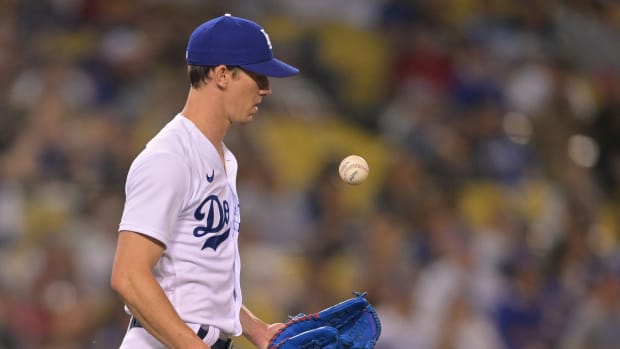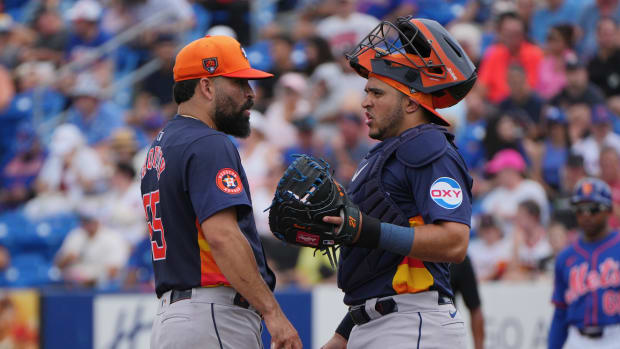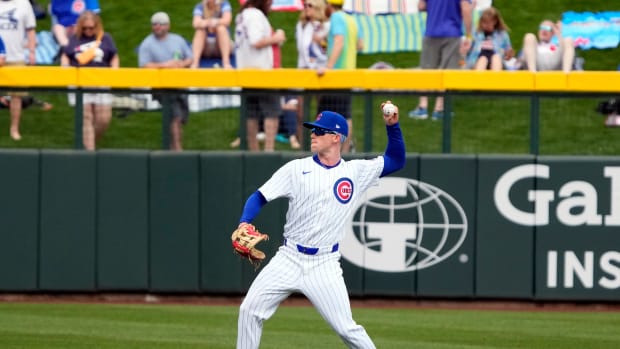Johnson, Showalter, Melvin proving past success was no fluke
Davey Johnson and Buck Showalter have the Nationals and Orioles, respectively, pointed toward the postseason. (US Presswire)
The Nationals, Orioles and A’s have been three of the most surprising teams in baseball this season, and though they are very different teams that have taken very different routes to contention, they have one thing in common: managers who have won before. I’m among those who are skeptical about just how much impact a manager can have on his team in terms of wins and losses, but the track records of two of those three men, the Nationals' Davey Johnson and the Orioles' Buck Showalter, are hard to refute. Similarly, what Bob Melvin has done this year with the A’s, five years removed from a similarly surprising division title at the helm of a young Diamondbacks team, suggests that he might have the same knack.
Let’s start with the veterans. In my opinion, Davey Johnson is a Hall of Fame manager. He’ll be best remembered as the mustachioed skipper of the 1986 Mets, but Johnson has won everywhere he has gone as a major league manager. In fact, in his 13 full seasons as a major league manager, he has only once endured a losing season. That came in his first campaign at the helm of the Dodgers in 1999. Los Angeles won 77 games that year. Under Johnson the next year, it won 86, a nine-game improvement. That October, he was fired.
That two-year stint with the Dodgers was Johnson’s worst. Assuming the Nationals win the National League East this year, Johnson will have led each of his other four teams, adding the Reds and Orioles to those already listed, to a first-place finish. In his six full seasons in New York, the Mets never finished below second place and only once failed to win 90 games. In the 14 years prior to his arrival, the Mets had finished above third just once and had never won more than 86 games in a season. Fired by the Mets mid-way through the 1990 season, Johnson ultimately took over the Reds a quarter of the way through their losing 1993 season and led them to first place in each of the next two years. He then moved to Baltimore in 1996 where he oversaw a 17-win improvement from the year before and a wild-card berth followed by another 10-game improvement and a first-place finish in 1997. Until this year, those remained the only playoff appearances by the Orioles since their last World Series win in 1983.
To recap, here’s the improvement each of Johnson’s teams made in his first full season at the helm:
Team | Year | + W |
Mets | 1984 | 22 |
Reds | 1994 | *21 |
Orioles | 1996 | 17 |
Dodgers | 1996 | -6 |
Nationals | 2012 | *18 |
*projected over 162 games
Buck Showalter has a similar track record of success in his previous jobs with the Yankees, Diamondbacks and Rangers, though in Showalter’s case, his teams tend to make their big jump in his second full season at the helm.
Team | Year | + W |
Yankees | 1993 | 12 |
Diamondbacks | 1999 | 35 |
Rangers | 2004 | 18 |
Orioles | 2012 | *23 |
The ability to turn a team around in short order is not a skill unique to these two men, but it is one that is very rare among major league managers. It also tends to be one that seems to be married to a lack of longevity. The best example of this is another man who I think should be inducted into the Hall of Fame for his managerial skill and success, the late Billy Martin. Here are the improvements Martin's teams made in his first full seasons at the helm:
Team | Year | + W |
1969 | 18 | |
1971 | 12 | |
Rangers | 1974 | 17 |
Yankees | 1976 | 14 |
A's | 1980 | 29 |
Yankees | 1983 | 12 |
Martin's other three stints with the Yankees lasted only part of one season, though it’s worth noting that when he took over the 1985 team with 145 games left in the season, he improved their record from the year before by 10 games, and when he took over the 1979 team from Bob Lemon 66 games into the season, he posted a winning percentage 56 points better than Lemon's despite Thurman Munson’s death on Aug. 2.
Of course, Martin never lasted more than three full seasons in any of his nine managerial stints, five of which, including his first, lasted one season or less. That was in large part due to Martin’s conflicts with ownership -- not just in New York -- and also because the intensity with which Martin spurred his charges also tended to burn them out. Martin once said that, as a manager, you have your mules and your racehorses, but no matter how much you whip a mule, you can’t make it into a racehorse. As my friend and fellow baseball scribe Steven Goldman often points out, Martin never took his own advance, whipping everyone equally. Martin took five teams to the playoffs, but was never fired in first place.
One can see a similar pattern in Showalter’s career. Both the Diamondbacks and Rangers took a big step back in his third year at the helm, shedding 15 and 10 wins, respectively, and Showalter didn’t last more than four years in any of his previous three managerial jobs, a particularly surprising development in Arizona, where he had been one of the team’s central baseball men since two years before its first ballgame. Showalter and Martin are polar opposites in terms of deportment, but their management styles are similarly intense and unforgiving. The big buzzword coming out of the Orioles’ clubhouse ever since Showalter took over in late 2010 has been “accountability,” and Showalter had his team playing hard right down to the last out of 2011 despite finishing 24 games behind the wild-card winner, but what remains to be seen is whether or not he has learned how to lighten the mood and ease off the gas when appropriate.
Johnson’s relationship with his players is often much the opposite. The Mets of the late ‘80s were wild in part because Johnson didn’t see babysitter in his job description and worried only about what his players did on the field. For Johnson, a sabermetric idol who played under sabermetric god Earl Weaver on the best of Weaver’s Orioles teams, winning is the product of astute pre-game analysis and letting his players play. Still, Johnson has not spent more than two full seasons with a single team since leaving the Mets, in large part due to conflicts with the front office. The impression of Johnson as a problematic subordinate was one reason that an entire decade passed between his stints in Los Angeles and Washington and was reinforced when the press recently overheard him yelling at Nationals general manager Mike Rizzo to “come down and manage the club.” Rizzo later said that such boisterous conversations are par for the course for the two, who retain a strong working relationship, but Johnson, who will be 70 in January, is the oldest manager in the majors and looks to be taking his current gig year-to-year. Recent reports have him likely to return for 2013.
As for Melvin, he’s 20 years younger than Johnson, has already overseen three losing seasons, not counting his two partial campaigns, and only saw the Mariners go south in his first, short-lived managerial job. Still, between this year’s A’s and the 2007 Diamondbacks, a team that won its division despite being outscored on the season, two of his last three full seasons have seen his team greatly overachieve, and both were teams that relied heavily on young players and pitching. Melvin currently has four rookies in his lineup, four in his rotation and two more among his top relievers; the ’07 Diamondbacks counted among their rookies or first-year starters Chris Young, Justin Upton, Mark Reynolds, Stephen Drew, Miguel Montero, Carlos Quentin and Micah Owings. Is this the start of a pattern or just a coincidence? Melvin may have to switch teams a couple more times for us to know for sure, or to pilot yet another, young, rebuilt A’s team to the playoffs. For now, though, Melvin should be in the discussion whenever one talks about today’s best managers.
-- By Cliff Corcoran




































